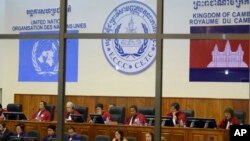Cambodian and UN officials say they still need more funding to continue the work of the Khmer Rouge tribunal, despite waning interest from some donors.
In an interview with VOA Khmer, Foreign Minister Hor Namhong said Cambodia is committed to continue funding to ensure the trials continue. Cambodia recently provided $1.8 million to the court, he said, which proves its willingness to see the court continue its work.
“On the other hand, I understand that the trials of the two remaining top leaders [Nuon Chea and Khieu Samphan] should not be delayed for too much time,” he said. “So the expenses would not be so much, as well.”
Cambodians and “the entire universe” understand the crimes of the Khmer Rouge, he said. “So the trials should not be delayed like this.”
Ieng Sary, the former foreign affairs minister of the regime, died while in custody, and his wife, Ieng Thirith, the former social affairs minister, was found mentally unfit to stand trial. “So there are only two defendants now,” he said. “The two are aging, sick and have health problems.”
Eri Kaneko, a spokeswoman for UN Secretary-General Ban Ki-moon, said the UN’s commitment to the tribunal also remains strong. Ban “calls upon the government of Cambodia and the international community to continue to support and uphold the independent judicial process.”
Meanwhile, observers say that other pressing matters in the global agenda make it hard for some donors to continue funding a tribunal that has faced delays and allegations of political interference and mismanagement.
James Goldston, executive director of the Open Society Justice Initiative, told VOA Khmer that the court has found it hard to generate the interest of certain donors.
“That being said, I think it is imperative that those donors who have contributed to the court today and others ensure that the judicial proceedings which have commenced be allowed to proceed to their judicial conclusion,” he said. “It would be a terrible thing if this tribunal has to close up shop before all cases had been effectively adjudicated.”
The scope of the first phase of the trial against Nuon Chea and Khieu Samphan was smaller than the upcoming trial phase, which begins later this month. The concern now is that the age of defendants requires a speedy trial, but one that stays true to their legal rights, he said.
“This court is an imperfect yet essential mechanism for accountability for of the most serious crimes committed in the 20th century,” he said. “The donors, the Cambodian government and the United Nations have struggled to take the court as far as it has to date, and it is imperative that they allow the mission of this court to be completed with full integrity and independence.”
Beth Van Schaack, a visiting scholar at the Center for International Security and Cooperation, at Stanford University, told VOA Khmer that the court is rightly moving ahead with the next trial phase. “The charges are simply too important, and time is of the essence given the age of the defendants,” she said.
This trial phase has more crimes under its scope, and therefore more victims as civil parties, she said. “But the victims’ representative is an experienced advocate who can ensure the rights of the victims are protected and their views are heard.”
The Trial Chamber, meanwhile, will call witnesses to testify on Oct. 20, and get responses from victims, defendants and their lawyers. The court is trying to ensure a speedy trial, tribunal spokesman Neth Pheaktra said. “We have the same concerns as the public about the two issues,” he said. “First, the issue of funding. Second, the issue of aging defendants.”
The court is now making more appeals to donors to fill a $1 million gap on the Cambodian side, while both sides face a lack of funding for 2015, he said.







